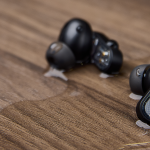During a radio interview on ABC RN on Monday morning, the Nationals leader was asked if Australia can “really say that we are the envy of the world” after the EU and US warned its citizens against travelling here.Mr Joyce replied: “Well, people aren’t dying”.Host Patricia Karvelas responded: “People are dying. People are dying every day.”Mr Joyce was quick to correct himself: “Sorry, sorry sorry. Yes, you are correct, I shouldn’t have said that. But the number in which – the fatality rate is very low. Obviously, that is a tragic thing for anybody … (to die) for any reason – for catching the flu. But the fatality rate of Omicron is remarkably low and Australia has done a remarkable job.”VIC: 11,695 CASES, 17 DEATHSVictoria has recorded 11,695 new cases and 17 Covid deaths in the past 24 hours.There are now 998 infected people in Victorian hospitals, with 119 in intensive care and 47 on ventilators.Victoria’s pre-Omicron peak for Covid hospitalisations was 851 in October when the state was battling a surge in Delta infections.However, the figure is dwarfed by the 2816 people in NSW who are in hospital with Covid.More than 93 per cent of eligible Victorians are fully vaccinated and the state has a mammoth 186,073 active cases.A total of 4488 PCR tests were taken on Sunday and 22,940 vaccines were administered at state hubs.It comes as Victorians waiting for elective surgeries will need to hold on longer, despite calls from surgeons to get them back into the operating theatre.Following public pleas from surgeons to repeal the “blanket ban” on elective surgeries, calling it a “blunt tool” that was leaving people in long-term pain, Victorian Premier Daniel Andrews said there was more to consider than the request of a few.“As soon as we can come out from the Code Brown (emergency declaration), as soon as we feel that it is safe and that we have significant capacity to resume services, that is exactly what we will do,” Mr Andrews said on Sunday.“With the greatest respect to the surgical community, they do one part of the work, they have got to be supported by teams of people.“It is very rare that there would be a surgeon providing care to a patient. Even a day procedure, there are other members of the team and those other members are very high need at the moment. “We are employing all sorts of people in different ways. But we have significant pressure in the system.”Mr Andrews’ comments come after Australian Orthopaedic Association Victorian branch chairman Adrian Trivett lashed the elective surgery ban. “There’s no doubt there’s capacity in the system to continue with some surgeries that are absolutely not life-threatening, but they’re causing disability and pain and they’re not being attended to,” Dr Trivett said.In a similar vein, gynaecologist Simon Gordon said his endometriosis patients were suffering in “chronic and severe pain” while he sat at home.“I’m at home mowing my lawns and turning the coffee machine on. Patients come to me and I say, ‘look, I’m not allowed to operate’,” Dr Gordon said.“Everyone is in the same boat and none of us are doing anything particularly useful … We’re sitting around doing very little when we could be operating.”Mr Andrews said there was “significant pressure” in the hospital system that required prioritisation.“We want the sickest patients getting treated quickest, and that is exactly what the settings are all about,” Mr Andrews said.“They are under constant review, and if we all go out and get our third dose, if we get our kids vaccinated, if we isolate when we are required to, we will have those services resume as fast as we possibly can.”NSW: 15,091 CASES, 24 DEATHSNSW has reported 15,091 new Covid-19 cases and 24 more deaths of people with the virus on Monday.While case numbers have dropped overnight, there are now 2816 people in NSW hospitals with coronavirus, 196 of those in intensive care, up from 2712 and 189 respectively on Sunday.NSW Premier Dominic Perrottet, Health Minister Brad Hazzard and chief health officer Kerry Chant are due to speak to the media at 10am on Monday.They will be joined by the NSW Department of Education secretary Georgina Harrisson and UNICEF Australia Chair Ann Sherry.QLD HAS 10,212 NEW CASES AND 13 NEW DEATHS Queensland Chief Health Officer Dr John Gerrard has announced Queensland will reach its Omicron peak next week after 10,212 new cases and 13 new deaths were recorded on Monday. Southeast Queensland can expect to reach it’s peak next week following an announcement from Dr Gerard. “Different regions will have their peaks at different times” he said. “There‘s likely to be pressure on the hospitals in metropolitan Brisbane this coming week — Gold Coast University Hospital and Robina hospital” The state marks its second day of a steady decline as over 19,926 people came forward to get tested. Over 3615 Queenslanders tested positive via a rapid antigen tests (RATs) in the last 24 hours. Monday’s deaths included 13 people all older than 70. There are near 878 people in hospital for Covid with 50 in intensive care, with 12 on ventilators.There are 879 in hospital with 50 of those in intensive care.This number do not include people who have been moved to private hospitals.The states death toll has surpassed 100 with 89.16 per cent of Queenslanders double vaccinated. State residents who had their second dose of a COVID-19 vaccine in October or earlier are now eligible for a third jab.Due to high vaccination rates the Queensland will experience a lower peak than NSW and other states. Falling hospitalisation numbers over a period of days would indicate the peak had passed said Dr Gerrard. “We’ll see when we get there … I’m thinking two, three or four days. That’s the sort of number we should be looking for,” he said.“The real proof will be when the numbers of patients start to fall and so that will be a number of days after the actual true peak and transmission and true peak of admission to hospital.”VIC, NSW SCHOOLS PLAN REVEALEDVictorian students and staff will be asked to test themselves twice a week, and teachers will be required to get their third dose, in order to keep case numbers under control in schools.As part of the plan to keep students in classrooms from “day one, term one”, Victorian Premier Daniel Andrews said testing and air-purifiers would be crucial to keeping schools open and students on campus.The state government will also call on inactive or retired teachers to rejoin the system to combat staff shortages.Mr Andrews said it was inevitable there would be a surge in Covid-19 cases, but insisted reopening schools was a priority.Victoria and NSW authorities have worked closely together to get students back in school from January 31.Both states will require students and teachers to use rapid antigen tests at home twice weekly.The federal government will split the cost with states opting to test students and teachers.Fourteen million tests will be delivered to schools and early childhood centres over the coming weeks – 6.6 million of which will be delivered in time for the first week.A key plank of the NSW plan will be the use of rapid antigen tests for students and staff, to be taken twice a week.Up to six million tests are being sent to 3000 public, Catholic and independent schools across NSW ahead of the start of term.Once the tests are delivered to schools by Wednesday, parents will be able to arrange a time to pick up the kits once they are contacted by school staff.Education Minister Sarah Mitchell on Sunday revealed schools would no longer be closed once a positive case was identified, and contact-tracing would not be completed.“If you are testing negative that’s great, come to school, but if you happen to get a positive test you need to let your principal know that you have tested positive to Covid,” Ms Mitchell said.NED-5151-Covid-19-booster-shots-graphic“You also need to let NSW Health know through the Services NSW app but we will no longer be closing schools when there is a positive Covid case in that community and we will not be conducting contact tracing anymore.”“We are really moving schools in line with what we see in community settings, but parents and carers and family members will be notified if there is Covid in your school community.”Schools will be required to carry out an improved cleaning regimen, while limited visitors will be allowed on school grounds.Face masks will be made mandatory for all teachers and high school students, but not primary school children.Air purifiers are being installed in “problem areas” and windows in older buildings are being repaired to ensure they can be opened and allow appropriate airflow.School staff will have to be double-vaccinated, while music, school sport and assemblies have all been given the green-light to go ahead.Overnight camps are also allowed with “risk planning” and parental consent.The premier said he highly recommended students in Year 3 and above wear masks and said visits would be limited to schools to ensure the Covid-safe plans could be undertaken.“We are incredibly confident that while there will be disruption, as we move through this period of time and as we know through this wave of the latest outbreak of Covid, there will be challenges that come our way,” Mr Dominic Perrottet said.“We need to make sure that we have kids back in the classroom in a safe way, and I think the work that has occurred right here in our state with the Department of Education, it has been a significant effort.”Mr Perrottet said he understood some parents may be “anxious” but said kids “do better” in the classroom.Some children have already missed a quarter of their schooling, he said.“It is what is best for mental health and social outcomes,” Mr Perrottet said.Chief Health Officer Dr Kerry Chant said while she supported face-to-face learning, there was expected to be some infections in schools.“We are calling upon all parents to ensure that any children with symptoms are not sent to school,” Dr Chant said.“We are likely to see some transmission in schools, but the strategies that have been put in place by Education, in conjunction with Health, are strong.”Dr Chant is urging parents to minimise their children’s activities in the first four weeks of schooling, such as sleepovers and “other activities that might drive infection” to preserve face-to-face time at schools.The testing regimen will be in place for the first four weeks of term before being reviewed for the future.Teachers and children at day care centres will also be offered RAT kits for testing twice-a-week.
Powered by WPeMatico






